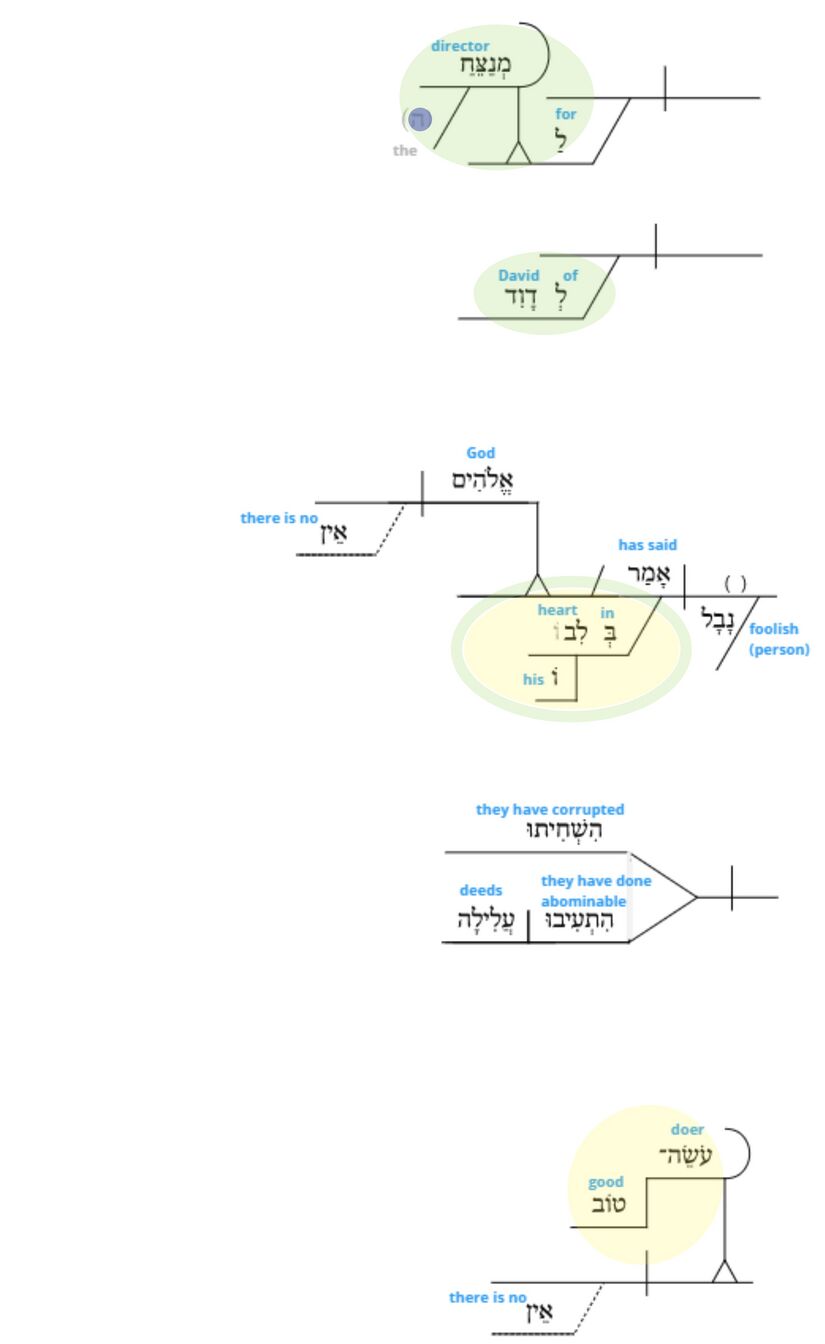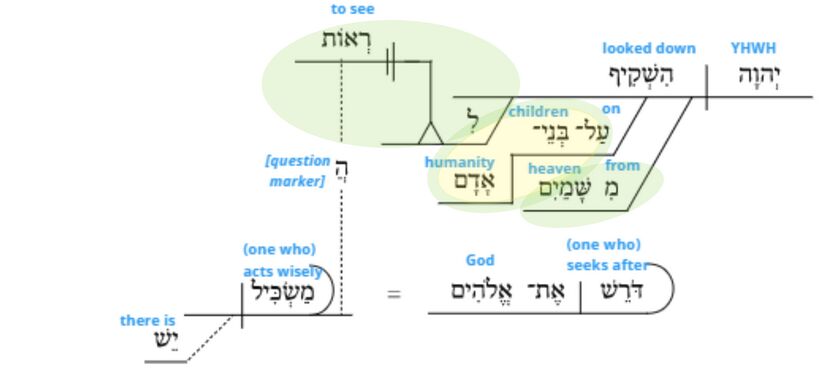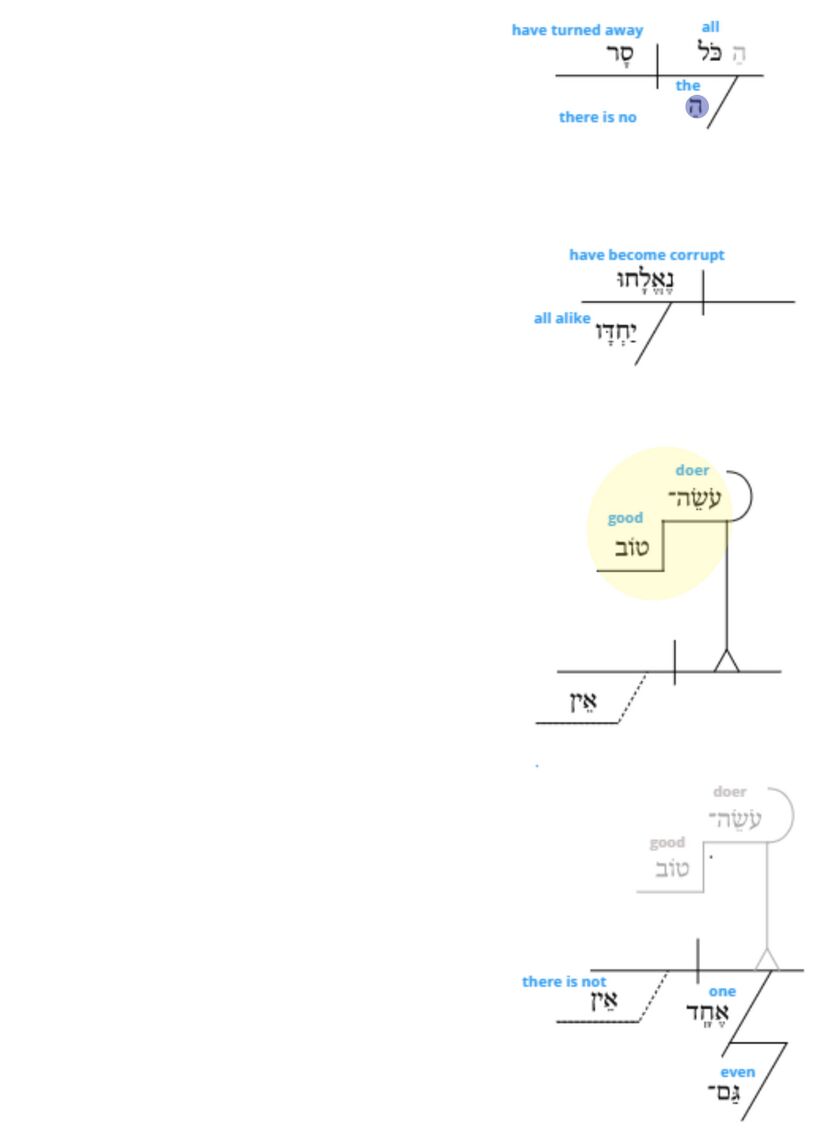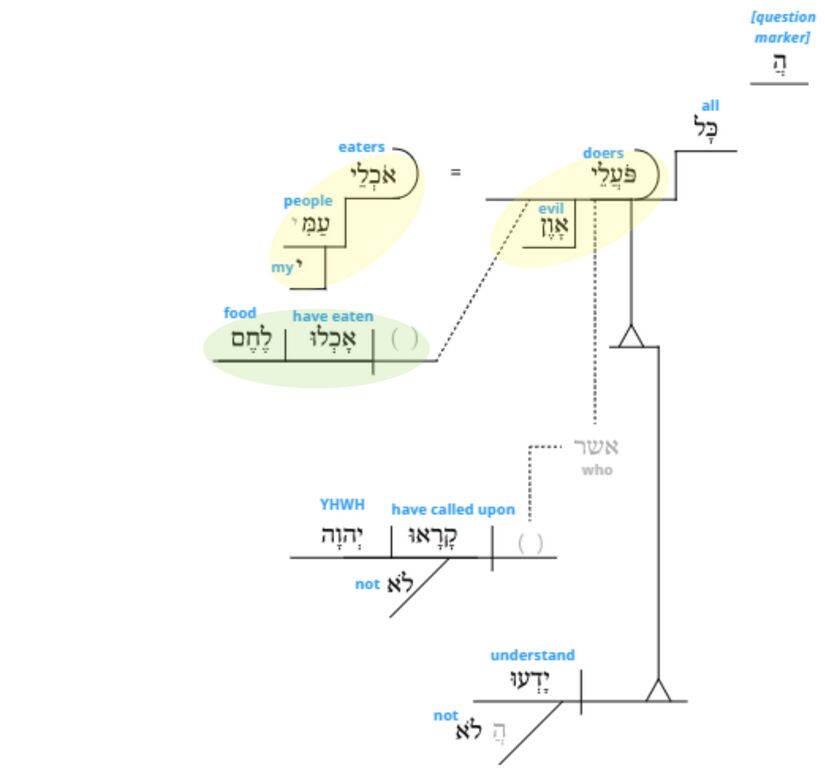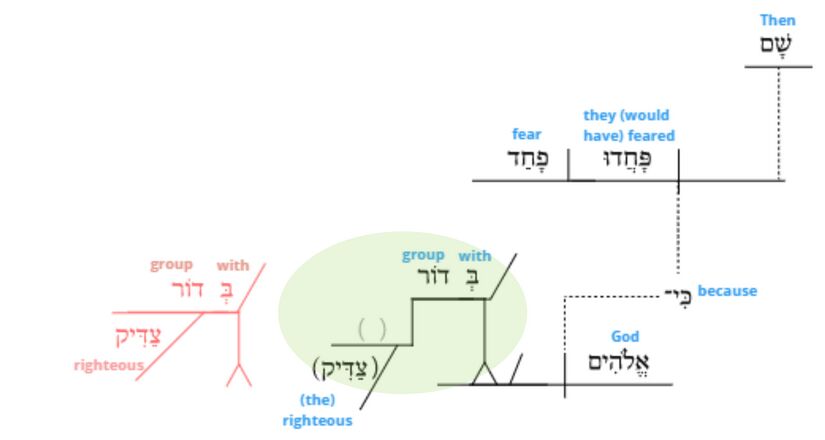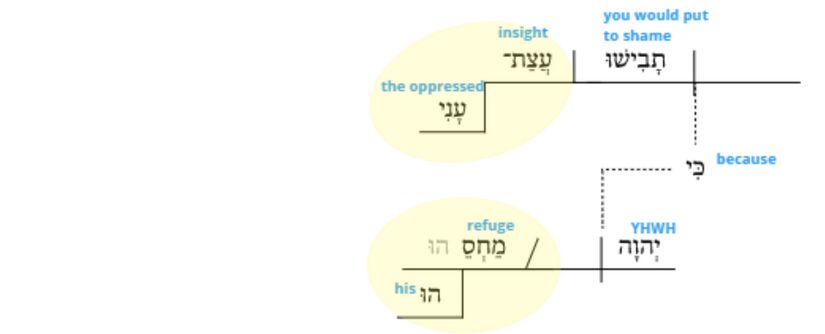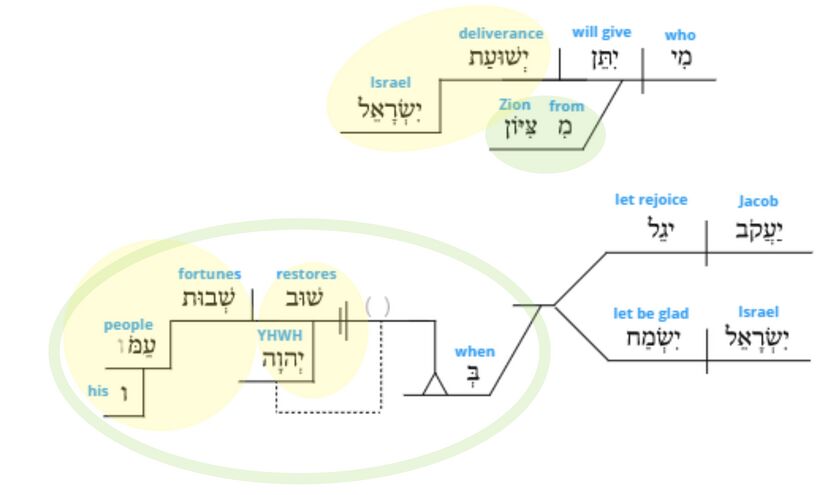Psalm 14 Verse-by-Verse
Welcome to the DRAFT Verse-by-Verse Notes for Psalm 14!
The Verse-by-Verse Notes present scholarly, exegetical materials (from all layers of analysis) in a verse-by-verse format. They often present alternative interpretive options and justification for a preferred interpretation. The Verse-by-Verse Notes are aimed at consultant-level users.
The discussion of each verse of this psalm includes the following items.
- A link to the part of the overview video where the verse in question is discussed.
- The verse in Hebrew and English.[1]
- An expanded paraphrase of the verse.[2]
- A grammatical diagram of the verse, which includes glosses for each word and phrase.[3]
- A series of notes on the verse, which contain information pertaining to the interpretation of the psalm (e.g., meaning of words and phrases, poetic features, difficult grammatical constructions, etc.).
Folly of the fool (vv. 1-3)
v. 1
Watch the Overview video on v. 1.
| v. | Hebrew | Close-but-clear |
|---|---|---|
| ss | לַמְנַצֵּ֗חַ לְדָ֫וִ֥ד | For the director. By David. |
| 1a | אָ֘מַ֤ר נָבָ֣ל בְּ֭לִבּוֹ אֵ֣ין אֱלֹהִ֑ים | The fool has said to himself, “There is no God”. |
| 1b | הִֽשְׁחִ֗יתוּ הִֽתְעִ֥יבוּ עֲלִילָ֗ה | They have corrupted [their deeds]; they have done abominable deeds; |
| 1c | אֵ֣ין עֹֽשֵׂה־טֽוֹב׃ | there is none who does good. |
Expanded Paraphrase
For the director. By David.
The fool has said to himself, “There is no God (who will know, care, or do anything about the bad things I do,) (so I can act with impunity because no god will hold me accountable).” (That is why) They (the fools,) have corrupted [their deeds] (from the good deeds they should do). They (the fools) have done abominable deeds. There is none (among the fools) who does good.
Grammatical Diagram
Notes
v. 2
Watch the Overview video on v. 2.
| v. | Hebrew | Close-but-clear |
|---|---|---|
| 2a | יְֽהוָ֗ה מִשָּׁמַיִם֮ הִשְׁקִ֪יף עַֽל־בְּנֵי־אָ֫דָ֥ם | YHWH looked down from heaven upon humans |
| 2b | לִ֭רְאוֹת הֲיֵ֣שׁ מַשְׂכִּ֑יל | in order to see: "Is there one who acts wisely, |
| 2c | דֹּ֝רֵשׁ אֶת־אֱלֹהִֽים׃ | who seeks after God?" |
Expanded Paraphrase
YHWH looked down from (his throne in) heaven upon humans (irony alert!) in order to see: "Is there is one who acts wisely, who seeks after God, (and has not done abominable deeds)?"
Grammatical Diagram
Notes
v. 3
Watch the Overview video on v. 3.
| v. | Hebrew | Close-but-clear |
|---|---|---|
| 3a | הַכֹּ֥ל סָר֮ יַחְדָּ֪ו נֶ֫אֱלָ֥חוּ | All have turned away; all alike have become corrupt; |
| 3b | אֵ֤ין עֹֽשֵׂה־ט֑וֹב אֵ֝֗ין גַּם־אֶחָֽד׃ | there is no one who does good; there is not even one. |
Expanded Paraphrase
(YHWH sees that) All (humans) (not just fools) have turned away (from the good path of seeking after God). All alike have become corrupt. There is no one who does good. There is not even one (who does good). (All humans are like the fool.)
Grammatical Diagram
Notes
Insight of the oppressed (vv. 4-6)
v. 4
Watch the Overview video on v. 4.
| v. | Hebrew | Close-but-clear |
|---|---|---|
| 4a | הֲלֹ֥א יָדְעוּ֮ כָּל־פֹּ֪עֲלֵ֫י | Do they not understand – all those who do evil, |
| 4b | אָ֥וֶן אֹכְלֵ֣י עַ֭מִּי אָ֣כְלוּ לֶ֑חֶם | who eat my people as they have eaten food, |
| 4c | יְ֝הוָ֗ה לֹ֣א קָרָֽאוּ׃ | who have not called upon YHWH? |
Expanded Paraphrase
Do they not understand (that they are wrong, and they will be held accountable) – (they, meaning) all those who do evil (thinking they'll get away with it), who eat my people (i.e. abused them for selfish gain) as they have eaten food (casually, with no thought to their evil actions), who have not called upon YHWH?
Grammatical Diagram
Notes
v. 5
Watch the Overview video on v. 5.
| v. | Hebrew | Close-but-clear |
|---|---|---|
| 5a | שָׁ֤ם ׀ פָּ֣חֲדוּ פָ֑חַד | Then they would have feared a fear, |
| 5b | כִּֽי־אֱ֝לֹהִ֗ים בְּד֣וֹר צַדִּֽיק׃ | because God is with the righteous group. |
Expanded Paraphrase
Then (if they did understand how wrong they are) they would have feared a fear, because (they would have seen that) God is with the righteous group (and they would recognise that God will hold them accountable for the wrong they've done).
Grammatical Diagram
Notes
v. 6
Watch the Overview video on v. 6.
| v. | Hebrew | Close-but-clear |
|---|---|---|
| 6a | עֲצַת־עָנִ֥י תָבִ֑ישׁוּ | You would put to shame the insight of the oppressed, |
| 6b | כִּ֖י יְהוָ֣ה מַחְסֵֽהוּ׃ | because YHWH is his refuge. |
Expanded Paraphrase
(Yet, the wicked do not know. Instead,) You (wicked) would put to shame the insight of the oppressed (which is that YHWH will ultimately care for them), because YHWH is his (king and) refuge (and you think YHWH doesn't care, so you mock those who do think so).
Grammatical Diagram
Notes
Deliverance (v. 7)
v. 7
Watch the Overview video on v. 7.
| v. | Hebrew | Close-but-clear |
|---|---|---|
| 7a | מִ֥י יִתֵּ֣ן מִצִּיּוֹן֮ יְשׁוּעַ֪ת יִשְׂרָ֫אֵ֥ל | Oh, that deliverance for Israel would come from Zion! |
| 7b | בְּשׁ֣וּב יְ֭הוָה שְׁב֣וּת עַמּ֑וֹ | When YHWH restores the fortunes of his people, |
| 7c | יָגֵ֥ל יַ֝עֲקֹ֗ב יִשְׂמַ֥ח יִשְׂרָֽאֵל׃ | let Jacob rejoice, let Israel be glad! |
Expanded Paraphrase
(In spite of all this, I know that YHWH will be true to his word. Even when I do not see him at work, I trust in his covenant. Therefore, I pray with confidence:) Oh, that deliverance for Israel would come from (YHWH who dwells in) Zion! When YHWH restores the fortune of his people, let Jacob rejoice, let Israel be glad!
Grammatical Diagram
Notes
Legends
Grammatical diagram
| Visualization | Description |
|---|---|
| The clause is represented by a horizontal line with a vertical line crossing through it, separating the subject and the verb. | |
| The object is indicated by a vertical line that does not cross the horizontal line of the clause. Infinitives and participles may also have objects. If the direct object marker (d.o.m.) is present in the text, it appears in the diagram immediately before the object. If the grammar includes a secondary object, the secondary object will appear after the object, separated by another vertical line that does not cross the horizontal line of the clause. | |
| The subject complement follows the verb (often omitted in Hebrew) separated with a line leaning toward the right. It can be a noun, a whole prepositional phrase or an adjective. The later two appear modifying the complement slot. | |
| When a noun further describes or renames the object, it is an object complement. The object complement follows the object separated by a line leaning toward the right. | |
| In a construct chain, the noun in the absolute form modifies the noun in the construct form. | |
| Participles are indicated in whatever position in the clause they are in with a curved line before the participle. Participles can occur as nominal, where they take the place of a noun, predicate, where they take the place of a verb, or attributive, where they modify a noun or a verb similar to adjectives or adverbs. | |
| Infinitives are indicated by two parallel lines before the infinitive that cross the horizontal line. Infinitive constructs can appear as the verb in an embedded clause. Infinitive absolutes typically appear as an adverbial. | |
| The subject of the infinitive often appears in construct to it. In this situation, the infinitive and subject are diagrammed as a construct chain. | |
| The object of the infinitive is indicated by a vertical line that does not cross the horizontal line of the infinitival clause. | |
| Modifiers are represented by a solid diagonal line from the word they modify. They can attach to verbs, adjectives, or nouns. If modifying a verb or adjective, it is an adverb, but if modifying a noun, it is an adjective, a quantifier, or a definite article. If an adverb is modifying a modifier, it is connected to the modifier by a small dashed horizontal line. | |
| Adverbials are indicated by a dashed diagonal line extending to a horizontal line. These are nouns or infinitives that function adverbially (modifying either a verb or a participle), but are not connected by a preposition. | |
| Prepositional phrases are indicated by a solid diagonal line extending to a horizontal line. The preposition is to the left of the diagonal line and the dependent of the preposition is on the horizontal line. They can modify verbs (adverbial) or nouns (adjectival). | |
| Embedded clauses are indicated by a "stand" that looks like an upside-down Y. The stand rests in the grammatical position that the clause fulfills. Extending from the top of the stand is a horizontal line for the clause. If introduced by a complementizer, for example כִּי, the complementizer appears before the stand. Embedded clauses can stand in the place of any noun. | |
| When clauses are joined by a conjunction, they are compound clauses. These clauses are connected by a vertical dotted line. The conjunction is placed next to the dotted line. | |
| Within a clause, if two or more parts of speech are compound, these are represented by angled lines reaching to the two compound elements connected by a solid vertical line. If a conjunction is used, the conjunction appears to the left of the vertical line. Almost all parts of speech can be compound. | |
| Subordinate clauses are indicated by a dashed line coming from the line dividing the subject from the predicate in the independent clause and leading to the horizontal line of the subordinate clause. The subordinating conjunction appears next to the dashed line. | |
| Relative clauses also have a dashed line, but the line connects the antecedent to the horizontal line of the relative clause. The relative particle appears next to the dashed line. | |
| Sentence fragments are represented by a horizontal line with no vertical lines. They are most frequently used in superscriptions to psalms. They are visually similar to discourse particles and vocatives, but most often consist of a noun phrase (that does not refer to a person or people group) or a prepositional phrase. | |
| In the body of the psalm, a horizontal line by itself (with no modifiers or vertical lines) can indicate either a discourse particle or a vocative (if the word is a noun referring to a person or people group). A discourse particle is a conjunction or particle that functions at the discourse level, not at the grammatical level. Vocatives can appear either before or after the clause addressed to them, depending on the word order of the Hebrew. | |
| Apposition is indicated by an equal sign equating the two noun phrases. This can occur with a noun in any function in a sentence. |
| Hebrew text colors | |
|---|---|
| Default preferred text | The default preferred reading is represented by a black line. The text of the MT is represented in bold black text. |
| Dispreferred reading | The dispreferred reading is an alternative interpretation of the grammar, represented by a pink line. The text of the MT is represented in bold pink text, while emendations and revocalizations retain their corresponding colors (see below). |
| Emended text | Emended text, text in which the consonants differ from the consonants of the Masoretic text, is represented by bold blue text, whether that reading is preferred or dispreferred. |
| Revocalized text | Revocalized text, text in which only the vowels differ from the vowels of the Masoretic text, is represented by bold purple text, whether that reading is preferred or dispreferred. |
| (Supplied elided element) | Any element that is elided in the Hebrew text is represented by bold gray text in parentheses. |
| ( ) | The position of a non-supplied elided element is represented by empty black parentheses. For example, this would be used in the place of the noun when an adjective functions substantivally or in the place of the antecedent when a relative clause has an implied antecedent. |
| Gloss text colors | |
|---|---|
| Gloss used in the CBC | The gloss used in the Close-but-Clear translation is represented by bold blue text. |
| Literal gloss >> derived meaning | A gloss that shows the more literal meaning as well as the derived figurative meaning is represented in blue text with arrows pointing towards the more figurative meaning. The gloss used in the CBC will be bolded. |
| Supplied elided element | The gloss for a supplied elided element is represented in bold gray text. |
Shapes and colours on grammatical diagram
| Visualization | Description |
|---|---|
| The prepositional phrase is indicated by a solid green oval. | |
| The construct chain is indicated by a solid yellow oval. | |
| When the conjunction ו appears at the phrase-level (not clause-level), it is indicated by a solid light purple oval. | |
| The article is indicated by a solid blue oval. |
Expanded paraphrase
(For more information, click "Expanded Paraphrase Legend" below.)
| Expanded paraphrase legend | |
|---|---|
| Close but Clear (CBC) translation | The CBC, our close but clear translation of the Hebrew, is represented in bold text. |
| Assumptions | Assumptions which provide background information, presuppositions, entailments, and inferences are represented in italics. |
References
14
- ↑ The Hebrew text comes from Open Scriptures Hebrew Bible, which presents the text of the Leningrad Codex (the Masoretic text). The English text is our own "Close-but-clear" translation (CBC). The CBC is a “wooden” translation that exists to provide a window into the Hebrew text. It is essentially an interlinear that has been put into English word-order. It is also similar to a “back-translation” (of the Hebrew) often used in Bible translation checking. It is important to remember that the CBC is not intended to be a stand-alone translation, but is rather a tool for using the Layer by Layer materials. The CBC is used as the primary display text (along with the Hebrew) for most analytical visualisations. It is also used as the display text for most videos.
- ↑ A legend for the expanded paraphrase is available near the bottom of this page, in the section titled "Legends."
- ↑ Legends for both the grammatical diagram and the shapes and colours on the grammatical diagram are available near the bottom of this page, in the section titled "Legends."
